Presented By: Life Sciences Institute (LSI)
LSI Seminar Series: Mitchell Weiss, M.D., Ph.D., St. Jude Children's Research Hospital
Taking out the trash: Protein quality control during normal and pathological erythropoiesis

Abstract:
Autophagy and ubiquitin-mediated proteolysis are fundamental pathways that eliminate unwanted or potentially damaging proteins during normal eukaryotic cell development and in various disease states. In this seminar, Mitchell Weiss will describe two examples in which these protein quality control mechanisms facilitate red blood cell development:
1. In beta thalassemia, HBB gene mutations cause loss of the beta globin subunit of hemoglobin with resultant buildup of the alpha globin subunit. Free alpha globin forms toxic precipitates that destroy erythroid precursors and shorten the half-life of mature red blood cells. Weiss shows that erythroid precursors eliminate free alpha globin by autophagy through a pathway that requires the ULK1 kinase but is independent of the canonical autophagy protein ATG5. mTORC1 inhibits ULK1 and rapamycin inhibition of mTORC1 stimulates ULK1-mediated autophagy of free alpha globin in beta thalassemic erythroblasts, illustrating a “druggable” pathway for potential therapies.
2. Weiss's group identified the E3 ubiquitin ligase FBXO11 in a CRISPR screen for proteins that facilitate red blood cell development. He shows that FBXO11 degrades BAHD1, a heterochromatin associated repressor protein bound to the promoters of erythroid genes. Elimination of BAHD1 at these genes “opens” local chromatin, thereby enabling binding of GATA1, a master regulator transcription factor that activates gene expression. These findings show how the developmentally timed activity of a single ubiquitin ligase controls cell fate by coordinately activating hundreds of lineage-specific genes.
About the Speaker:
Mitchell Weiss became chair of the Hematology Department at St. Jude Children’s Research Hospital in 2014. Before that, he was the associate director for The Human Embryonic Stem Cell Core Facility at The Children’s Hospital of Philadelphia. Weiss sees pediatric patients with non-malignant blood disorders in the hospital and studies these diseases in the laboratory. His research interests are to better understand the mechanisms of normal red blood cell development and use this information to treat common blood disorders, including sickle cell disease and beta-thalassemia. Weiss previously served as the director of the Pediatric Physician-Scientist Development Program at CHOP and associate director of the Combined Degree and Physician Scholar Program at Penn. His career has been dedicated to pediatric hematology research and training the next generation of physician-scientists in the field.
Autophagy and ubiquitin-mediated proteolysis are fundamental pathways that eliminate unwanted or potentially damaging proteins during normal eukaryotic cell development and in various disease states. In this seminar, Mitchell Weiss will describe two examples in which these protein quality control mechanisms facilitate red blood cell development:
1. In beta thalassemia, HBB gene mutations cause loss of the beta globin subunit of hemoglobin with resultant buildup of the alpha globin subunit. Free alpha globin forms toxic precipitates that destroy erythroid precursors and shorten the half-life of mature red blood cells. Weiss shows that erythroid precursors eliminate free alpha globin by autophagy through a pathway that requires the ULK1 kinase but is independent of the canonical autophagy protein ATG5. mTORC1 inhibits ULK1 and rapamycin inhibition of mTORC1 stimulates ULK1-mediated autophagy of free alpha globin in beta thalassemic erythroblasts, illustrating a “druggable” pathway for potential therapies.
2. Weiss's group identified the E3 ubiquitin ligase FBXO11 in a CRISPR screen for proteins that facilitate red blood cell development. He shows that FBXO11 degrades BAHD1, a heterochromatin associated repressor protein bound to the promoters of erythroid genes. Elimination of BAHD1 at these genes “opens” local chromatin, thereby enabling binding of GATA1, a master regulator transcription factor that activates gene expression. These findings show how the developmentally timed activity of a single ubiquitin ligase controls cell fate by coordinately activating hundreds of lineage-specific genes.
About the Speaker:
Mitchell Weiss became chair of the Hematology Department at St. Jude Children’s Research Hospital in 2014. Before that, he was the associate director for The Human Embryonic Stem Cell Core Facility at The Children’s Hospital of Philadelphia. Weiss sees pediatric patients with non-malignant blood disorders in the hospital and studies these diseases in the laboratory. His research interests are to better understand the mechanisms of normal red blood cell development and use this information to treat common blood disorders, including sickle cell disease and beta-thalassemia. Weiss previously served as the director of the Pediatric Physician-Scientist Development Program at CHOP and associate director of the Combined Degree and Physician Scholar Program at Penn. His career has been dedicated to pediatric hematology research and training the next generation of physician-scientists in the field.